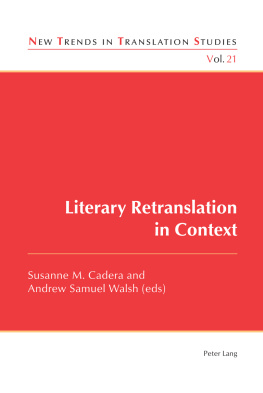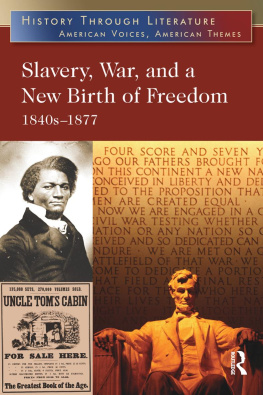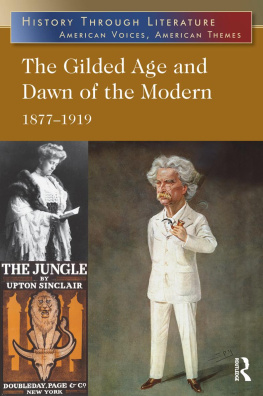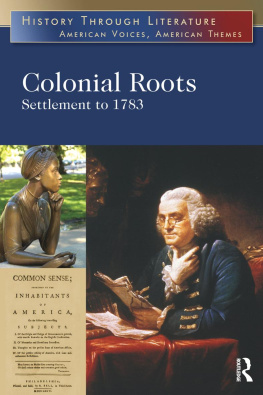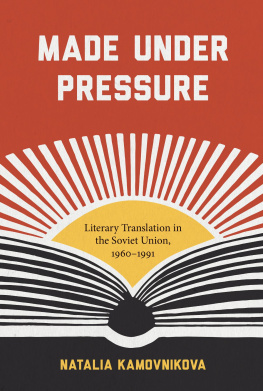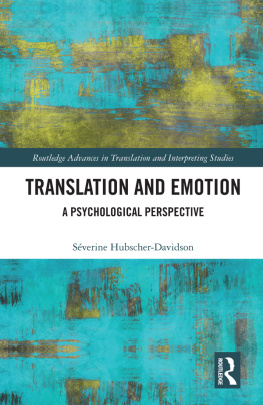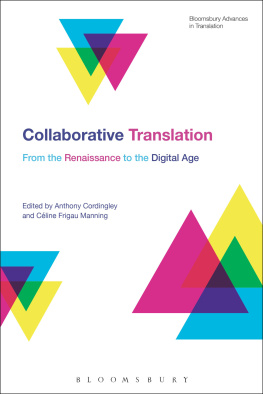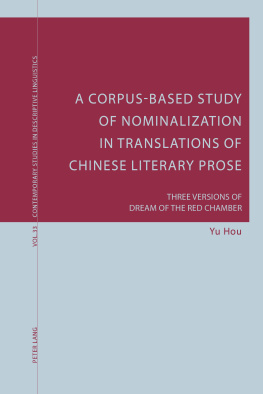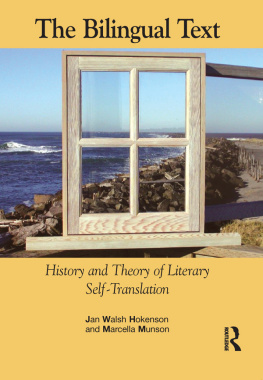Susanne M. Cadera and

PETER LANG
Oxford Bern Berlin Bruxelles Frankfurt am Main New York Wien
Bibliographic information published by Die Deutsche Nationalbibliothek.
Die Deutsche Nationalbibliothek lists this publication in the Deutsche Nationalbibliografie; detailed bibliographic data is available on the Internet at http://dnb.d-nb.de.
A catalogue record for this book is available from the British Library.
Library of Congress Cataloging-in-Publication Data
Names: Cadera, Susanne M., editor. | Walsh, Andrew Samuel, editor.
Title: Literary retranslation in context / Susanne M. Cadera and Andrew Samuel Walsh (eds).
Description: Oxford ; New York : Peter Lang, 2016. | Series: New trends in translation studies ; 21 | Includes bibliographical references and index.
Identifiers: LCCN 2016044365 | ISBN 9783034319966 (alk. paper)
Subjects: LCSH: Literature--Translations--History and criticism. | Translating and interpreting.
Classification: LCC PN241 .L564 2016 | DDC 418/.04--dc23 LC record available at https://lccn.loc.gov/2016044365
ISSN 1664-249X
ISBN 978-3-0343-1996-6 (print) ISBN 978-1-78707-221-3 (ePDF)
ISBN 978-1-78707-222-0 (ePub) ISBN 978-1-78707-223-7 (mobi)
Peter Lang AG, International Academic Publishers, Bern 2017
Hochfeldstrasse 32, CH-3012 Bern, Switzerland
All rights reserved.
All parts of this publication are protected by copyright.
Any utilisation outside the strict limits of the copyright law, without the permission of the publisher, is forbidden and liable to prosecution.
This applies in particular to reproductions, translations, microfilming, and storage and processing in electronic retrieval systems.
This publication has been peer reviewed.
About the author(s)/editor(s)
Susanne M. Cadera is Professor of German Language, Culture, Literature and Comparative Translation Studies in the Department of Translation and Interpreting at Comillas Pontifical University in Madrid. She has collaborated on various international projects and currently leads the research group INTRA and the project Studies on Textual and Cultural Interaction: Retranslations (RETRADES) at Comillas Pontifical University. Her recent publications focus on features and translations of fictive orality in narrative texts and on contextual translation studies.
Andrew Samuel Walsh is Lecturer in English, Translation and Communication Studies in the Department of Translation and Interpreting at Comillas Pontifical University in Madrid. He has also taught at the University of Granada and the Autonomous University of Madrid. His research interests lie in the fields of literary translation and comparative literature.
About the book
The present study examines the interrelation between literary texts, their successive retranslations and the corresponding historical, social and cultural backgrounds that inform these versions. In the case of each text, the authors analyse both the external factors (sociohistorical circumstances, publishing context, authors, translators, etc.) and the internal ones (text analysis, translation procedures or strategies) that influence this interrelation. The book also considers how the decision to retranslate a literary work may be due not only to the commercial criteria established by publishers, but also to external developments in the historical, cultural or social environment of the target culture, or to an evolution in the poetic and aesthetic considerations of the translations themselves, since translational activities and approaches change and evolve over time. Consequently, the procedures inherent in translation may influence the reception and perception of the original text in the target culture. Finally, the book explores how the retranslations of a work of literature may even change the image of an author and the perception of his or her work that has been established by previous translations.
This eBook can be cited
This edition of the eBook can be cited. To enable this we have marked the start and end of a page. In cases where a word straddles a page break, the marker is placed inside the word at exactly the same position as in the physical book. This means that occasionally a word might be bifurcated by this marker.
| 1
The present text is the product of the research conducted by the RETRADES (Studies on Cultural and Textual Interaction: Retranslation) research project, which began in 2012 and was led by Prof. Susanne M. Cadera at the Department of Translation and Interpreting of Comillas Pontifical University in Madrid. The fundamental aim of this project was to answer the following question: What is the interrelation between literary texts and their translations with the socio-historical characteristics of the period in which they were produced? The central thesis to be explored was that each new translation must represent a socio-historical change and that, although the decision to retranslate a work may undoubtedly be due to a commercial decision on the part of the publisher, it must also be linked to external changes in the historical, cultural and social context of the target culture or to changes in the poetic and aesthetic considerations of the translations themselves. As tends to occur in any other discipline, translational activity and awareness change over time and the procedures inherent to a translation may influence the reception of the text and the perception of its author in the target culture. Consequently, the retranslation of a work may even change the image of an author and the understanding of his or her work that had been established by previous translations.
The conclusion reached by the research conducted during the first three years of this project was in fact contrary to the initial hypothesis proposed, as we discovered that there is not always a clearly identifiable relation between the importance of authors in their original culture and the retranslation of their work. Indeed, in the case of peninsular Spanish, there are many instances of established authors from the canon of world literature whose work has not been retranslated at all. This curious question in itself as to who has not been retranslated and why not would be worthy of a profound and systematic study which unfortunately escaped 1 | 2 the confines of this first period of our research project. In other cases, the phenomenon detected was the precise opposite; that is, some authors such as Kafka have been retranslated so many times that it is difficult to carry out a detailed study of the differences between all of the retranslations. As in the case of the lack of retranslations, a more detailed study of the reasons for the abundance of retranslations of certain authors would be of interest as a topic for future research.
In several chapters in the book, special consideration was also given to the retranslations published during Francos dictatorship due to the possible manipulation that these texts may have endured because of the censorship system in place at the time as well as the possibility of

